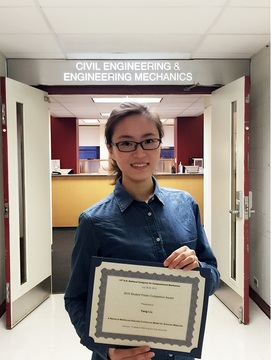|
URL: http://www.vanderbilt.edu/emipmc2016/EMI.mini-symposia.php
EMI-MS-16: Computational Geomechanics Steve WaiChing Sun, Qiushi Chen, Xiaoyu Song, Joshua White, Richard Regueiro, Jose Andrade, Majid Manzari, Ronaldo Borja Geomaterials, such as soil, rock and concrete, are multiphase porous materials whose macroscopic mechanical behavior is governed by grain size distribution and mineralogy, fluid-saturation, pore space, temperature, loading paths and rate, drainage conditions, chemical reactions, and other factors. As a result, predicting the mechanical response of geomaterials often requires knowledge on how several processes, which often take place in different spatial and temporal domains, interact with each other across length scales. This mini-symposium is intended to provide a forum for researchers to present contributions on recent advances in Computational Geomechanics. Topics within the scope of interests include, but are not limited to, the following: (1) development and validation of constitutive models that address multi-physical coupling effects, (2) discrete and continuum formulations for geomechanics problems, (3) iterative sequential couplings of fluid and solid solvers, (4) uncertainty quantification for geomechanics problems, (5) multiscale mechanics, (6) modeling of weak and strong discontinuities, (7) regularization techniques to circumvent pathological mesh dependence, and (8) techniques to model crack growth and fragmentation processes in geomaterials.
0 Comments
Vortragsankündigung: Im Rahmen der Forschergruppe FOR 2089 ist Prof. WaiChing Sun
als Gast am Institut für Statik und Dynamik der Tragwerke und wird über seine Arbeiten be- richten Datum: 27.08.2015 Raum: Bey 67 Zeit: 14:00 Uhr Multiscale coupling method for fluid-infiltrating porous media at the finite deformation range Department of Civil Engineering and Engineering Mechanics, Fu Foundation School of Engineering and Applied Science, Columbia University, New York Email: [email protected] The mechanical behavior of a fluid-infiltrating porous solid is significantly influenced by the presence and diffusion of the pore fluid in the void. This hydro-mechanical coupling effect can be observed in a wide range of materials, including rocks, soils, concretes, bones and soft tissues. Due to the high computational demand, explicitly simulating the pore-scale solid-fluid interactions remains impractical for engineering problems commonly encountered in the field and basin scales. The objective of this talk is to present classes of multiscale technologies that couple hydro-mechanical simulations across different spatial and temporal scales. The first class of model is a concurrent coupling model in which deformation-diffusion problems are re-casted as a two-fold saddle point problem that optimizes the constrained partitioned incremental work of a multi-field energy functional. By enforcing compatibility across length scales, pore-scale simulations in confined domain can be coupled with large-scale field problems while maintaining numerical stability and accuracy. The combined usage of temporal operator split and Arlequin model to resolve highly refined details of space-time porous continuum will be discussed. The second class of multiscale model is a nonlocal hierarchical multiscale framework that couples grain-scale network-DEM simulations with a macroscopic hydro-mechanical mixed finite element model. This hierarchical nonlocal DEM-mixed-FEM coupling retains the simplicity and efficiency of the continuum-based finite element model, while possessing the original length scale of the granular system. Techniques for two-scale material identification with inverse problems will be discussed. The pros and cons of these different multiscale-coupling strategies will be demonstrated in numerical examples. The proposal #1462760 "A Phase Field Arlequin Model for Resolving Nonlocal Hydromechanical Effects of Porous Media Across Time and Spatial Scales" submitted to Mechanics of Material program of NSF has been awarded at the level of $300,000. The funding will support research and educational activities for a new type of computational poromechanics model that enables modeling of multi-physical events at different spatial and temporal scales.
In additional to this single-PI proposal, the research group has also received support NSF from NSF proposal #1520732 and #1516300 in which Prof. Sun served as co-PI. Two multiscale discrete-continuum models for predicting fluid-saturated geomaterials from grain- to field-scales
Prof. Steve Waiching Sun Department of Civil Engineering and Engineering Mechanics Columbia University, New York Monday, August 10, 2015 2:00 PM – 3:00 PM Building 823 Room 2279 The mechanical behavior of a fluid-infiltrating porous solid is significantly influenced by the presence and diffusion of the pore fluid in the void. This hydro-mechanical coupling effect can be observed in a wide range of materials, including rocks, soils, concretes, bones and soft tissues. Due to the high computational demand, explicitly simulating the pore scale solid-fluid interactions remains impractical for engineering problems commonly encountered in the field and basin scales. The objective of this talk is to present two classes of multiscale technologies that couple across different spatial and temporal scales. The first class of model is a concurrent coupling model in which deformation-diffusion problems are casted as the two-fold saddle point that optimizes the constrained partitioned incremental work of a multi-field energy functional. By enforcing compatibility across length scales, pore-scale simulations in confined domain can be coupled with large-scale field problems while maintaining numerical stability and accuracy. The combined usage of temporal operator split and Arlequin model to resolve highly refined details of space-time porous continuum will be discussed. The second class of multiscale model is a nonlocal hierarchical multiscale framework that couples grain-scale discrete element simulations with a hydromechanical mixed finite element model. This hierarchical nonlocal DEM-mixed-FEM coupling retains the simplicity and efficiency of the continuum-based finite element model, while possessing the original length scale of the granular system. Techniques for two-scale material identification with Dakota will be discussed. The pros and cons of these two different coupling strategies will be demonstrated in numerical examples. |
Group NewsNews about Computational Poromechanics lab at Columbia University. Categories
All
Archives
July 2023
|


 RSS Feed
RSS Feed